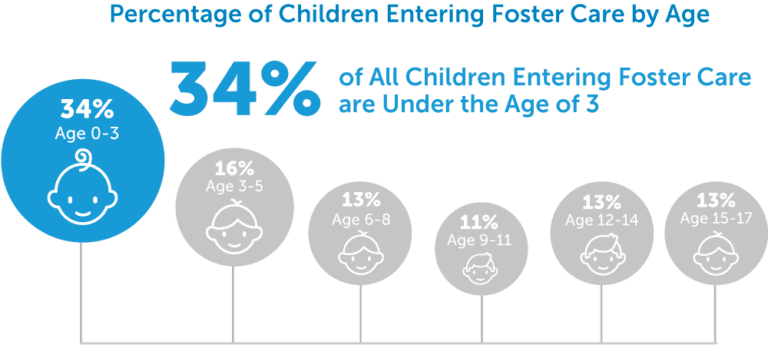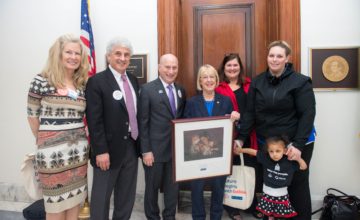The Strengthening America's Families Act (SAFA)

The Strengthening America’s Families Act (SAFA): Transforming the lives of infants, toddlers, and their families.
The stakes couldn’t be higher for babies entering the child welfare system—yet the system was not devised to support their unique developmental needs or those of their families. Infants and toddlers aged 0 to 3 experience the highest rates of maltreatment and comprise one-third of foster care entries—more than any other age group.

Administration on Children, Youth and Families, Children’s Bureau. (2022). Child Maltreatment 2020.
Because of their rapid brain development, young children who experience maltreatment–and too often the instability of life in foster care–have a high likelihood of significant and detrimental impacts on their emotional and cognitive development, with lasting effects. Child welfare systems rarely provide age-appropriate developmental or trauma responsive services, and often do not take a holistic approach that addresses parents’ past trauma as well.
The circumstances leading to family involvement in child welfare are complex, requiring multi-faceted solutions to prevent abuse and neglect or placement in foster care. Ensuring aligned and integrated early childhood systems that address the needs of families at the earliest opportunity lessens the need for them to move deeper into intervening systems. While some states and communities are working to build such systems, many states and communities lack the support structures to accomplish this goal for families in child welfare, much less those whose involvement could be prevented.
The Strengthening America’s Families Act would support the efforts of states and localities to transform child welfare policy and practice through community-based Infant-Toddler Court Teams (ITCT).
This bipartisan legislation, introduced by Representatives Rosa DeLauro (CT-03) and Gus Bilirakis (FL-12) would authorize ongoing work through the Infant-Toddler Court Program, a project funded through the Maternal and Child Health Bureau using special project funds.
Infant-Toddler Court Teams work collaboratively to coordinate a range of comprehensive, trauma-informed infant, toddler, and family supports and services both for families with babies in need of preventive services and in the child welfare system. While SAFA would embed an approach anchored in the court system, it is an entry point for cross-system collaboration to effectively serve families across multiple areas of need at the state, local, and individual family levels.
SAFA will provide funding to states through competitive grants to coordinate state service agencies and establish and support community Infant-Toddler Court Teams, working with judges and other community leaders, including child welfare professionals. Communities and states will receive training and technical assistance to develop their programs with fidelity and deliver evidence-based services.
Learn more about The Strengthening America’s Families Act.
The Strengthening America's Families Act would authorize the Infant-Toddler Court Teams’ work that has had measurable success:
Repeat maltreatment rate was 0.7 percent within 12 months compared with the 9.1 percent national standard.
of babies and toddlers were placed permanently within a year, which is double the national standard.
nearly two-thirds of babies and toddlers are reunified or find permanent homes with members of their families.
Children are reaching permanency 2x faster than babies and toddlers in the general foster care population.
Source: Cecilia Casanueva, Sarah Harris, Christine Carr, Chelsea Burfeind, Keith Smith, Final Evaluation Report the Quality Improvement Center for Research-Based Infant-Toddler Court Teams (RTI International, December 2017).
Families Support The Strengthening America’s Families Act.

Strengthening Families with Infants and Toddlers: A Policy Framework for States

Child Welfare Data and Policy Briefs

A Sustainability Toolkit for Infant-Toddler Court Team States and Sites

Supporting Sustainability For Infant-Toddler Court Teams: A Federal Funding Guide

ZERO TO THREE’s Infant and Early Childhood Mental Health (IECMH) Guiding Principles

What does trauma do to a baby’s brain?

Infant and Early Childhood Mental Health (IECMH) Policy
Be a Big Voice for Little Kids
Tell Congress to #ThinkBabiesAndAct and
transform the child welfare system!

